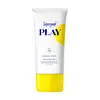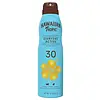What's inside
What's inside
 Key Ingredients
Key Ingredients

 Benefits
Benefits

 Concerns
Concerns

 Ingredients Side-by-side
Ingredients Side-by-side

Butyl Methoxydibenzoylmethane 3%
UV AbsorberHomosalate 10%
Skin ConditioningEthylhexyl Salicylate 5%
UV AbsorberWater
Skin ConditioningPolyester-8
Skin ConditioningAcrylates Copolymer
Diisopropyl Sebacate
EmollientGlycerin
HumectantIsodecyl Neopentanoate
EmollientIsododecane
EmollientLauryl Lactate
EmollientCetyl Alcohol
EmollientPotassium Cetyl Phosphate
EmulsifyingBrassica Campestris/Aleurites Fordi Oil Copolymer
Skin ConditioningOryza Sativa Bran Extract
Skin ConditioningCetearyl Olivate
Ammonium Acryloyldimethyltaurate/Vp Copolymer
Hydroxyacetophenone
AntioxidantSorbitan Olivate
EmulsifyingDiethylhexyl Syringylidenemalonate
Skin ProtectingAniba Rosaeodora Wood Oil
AstringentChlorphenesin
AntimicrobialCitrus Aurantium Dulcis Peel Oil
MaskingCitrus Limon Peel Oil
MaskingEthylhexylglycerin
Skin ConditioningEucalyptus Globulus Leaf Oil
PerfumingOcimum Basilicum Flower/Leaf Extract
TonicPelargonium Graveolens Flower Oil
MaskingPogostemon Cablin Leaf Oil
MaskingPentylene Glycol
Skin Conditioning1,2-Hexanediol
Skin ConditioningCaprylyl Glycol
EmollientXanthan Gum
EmulsifyingHelianthus Annuus Extract
EmollientBehenic Acid
CleansingCetyl Behenate
Isostearyl Isostearate
EmollientTrisodium Ethylenediamine Disuccinate
Tocopherol
AntioxidantAllantoin
Skin ConditioningRosmarinus Officinalis Leaf Extract
AntimicrobialCaprylic/Capric Triglyceride
MaskingPanthenol
Skin ConditioningPentasodium Triphosphate
BufferingCitric Acid
BufferingButyl Methoxydibenzoylmethane 3%, Homosalate 10%, Ethylhexyl Salicylate 5%, Water, Polyester-8, Acrylates Copolymer, Diisopropyl Sebacate, Glycerin, Isodecyl Neopentanoate, Isododecane, Lauryl Lactate, Cetyl Alcohol, Potassium Cetyl Phosphate, Brassica Campestris/Aleurites Fordi Oil Copolymer, Oryza Sativa Bran Extract, Cetearyl Olivate, Ammonium Acryloyldimethyltaurate/Vp Copolymer, Hydroxyacetophenone, Sorbitan Olivate, Diethylhexyl Syringylidenemalonate, Aniba Rosaeodora Wood Oil, Chlorphenesin, Citrus Aurantium Dulcis Peel Oil, Citrus Limon Peel Oil, Ethylhexylglycerin, Eucalyptus Globulus Leaf Oil, Ocimum Basilicum Flower/Leaf Extract, Pelargonium Graveolens Flower Oil, Pogostemon Cablin Leaf Oil, Pentylene Glycol, 1,2-Hexanediol, Caprylyl Glycol, Xanthan Gum, Helianthus Annuus Extract, Behenic Acid, Cetyl Behenate, Isostearyl Isostearate, Trisodium Ethylenediamine Disuccinate, Tocopherol, Allantoin, Rosmarinus Officinalis Leaf Extract, Caprylic/Capric Triglyceride, Panthenol, Pentasodium Triphosphate, Citric Acid
Butyl Methoxydibenzoylmethane 2%
UV AbsorberHomosalate 7%
Skin ConditioningOctocrylene 5%
UV AbsorberAlcohol Denat.
AntimicrobialIsobutane
Isododecane
EmollientDiisopropyl Adipate
EmollientLauryl PEG-8 Dimethicone
Phenylisopropyl Dimethicone
Skin ConditioningPolyglyceryl-3 Stearate/Isostearate/Dimer Dilinoleate Copolymer
Skin ConditioningCaprylyl Glycol
EmollientParfum
MaskingMethyl Dihydroabietate
Paraffinum Liquidum
EmollientAscorbyl Palmitate
AntioxidantTocopheryl Acetate
AntioxidantPanthenol
Skin ConditioningWater
Skin ConditioningAloe Barbadensis Leaf Extract
EmollientCarica Papaya Fruit Extract
Skin ConditioningColocasia Antiquorum Root Extract
Skin ConditioningMangifera Indica Fruit Extract
Skin ConditioningPassiflora Incarnata Fruit Extract
Skin ConditioningPlumeria Acutifolia Flower Extract
Skin ConditioningPsidium Guajava Fruit Extract
AstringentButyl Methoxydibenzoylmethane 2%, Homosalate 7%, Octocrylene 5%, Alcohol Denat., Isobutane, Isododecane, Diisopropyl Adipate, Lauryl PEG-8 Dimethicone, Phenylisopropyl Dimethicone, Polyglyceryl-3 Stearate/Isostearate/Dimer Dilinoleate Copolymer, Caprylyl Glycol, Parfum, Methyl Dihydroabietate, Paraffinum Liquidum, Ascorbyl Palmitate, Tocopheryl Acetate, Panthenol, Water, Aloe Barbadensis Leaf Extract, Carica Papaya Fruit Extract, Colocasia Antiquorum Root Extract, Mangifera Indica Fruit Extract, Passiflora Incarnata Fruit Extract, Plumeria Acutifolia Flower Extract, Psidium Guajava Fruit Extract
 Reviews
Reviews

Ingredients Explained
These ingredients are found in both products.
Ingredients higher up in an ingredient list are typically present in a larger amount.
Also known as Avobenzone, this ingredient is a chemical sunscreen filter that provides protection in the UV-A range.
Avobenzone is globally approved and is the most commonly used UV-A filter in the world.
Studies have found that avobenzone becomes ineffective when exposed to UV light (it is not photostable; meaning that it breaks down in sunlight). Because of this, formulations that include avobenzone will usually contain stabilizers such as octocrylene.
However, some modern formulations (looking at you, EU!) are able to stabilize avobenzone by coating the molecules.
Avobenzone does not protect against the UV-B range, so it's important to check that the sunscreen you're using contains other UV filters that do!
The highest concentration of avobenzone permitted is 3% in the US, and 5% in the EU.
Learn more about Butyl MethoxydibenzoylmethaneCaprylyl Glycol is a humectant and emollient, meaning it attracts and preserves moisture.
It is a common ingredient in many products, especially those designed to hydrate skin. The primary benefits are retaining moisture, skin softening, and promoting a healthy skin barrier.
Though Caprylyl Glycol is an alcohol derived from fatty acids, it is not the kind that can dry out skin.
This ingredient is also used as a preservative to extend the life of products. It has slight antimicrobial properties.
Learn more about Caprylyl GlycolHomosalate is a chemical sunscreen filter that provides protection in the UV-B range (280nm - 320 nm), with a peak protection at 306 nm. It is internationally approved for use in sunscreens.
Homosalate is not photo-stable, meaning it's strength as a UV filter degrades over time with exposure to the sun. Because of this, it's often used in combination with other chemical sunscreen filters as avobenzone (which protects from the UV-A range). Homosalate also helps act as a solvent for harder-to-dissolve UV filters.
(Part of the reason that sunscreens need to be frequently re-applied is due to the photo instability of many chemical sunscreen filters)
Currently, homosalate is approved in concentrations up to 10% in the EU and 15% in the US. The FDA is currently doing further research on the effects of homosalate, and it is possible that these approved concentrations will change in the future.
Learn more about HomosalateIsododecane is a fragrance, emollient, and solvent.
As an emollient, it helps your skin stay soft and hydrated. Emollients help trap moisture into your skin.
Isododecane's role as a solvent makes it a great texture enhancer. It spreads smoothly on skin and does not leave a sticky feeling behind. Isododecane also helps prevent color transfer in makeup products.
Isododecane is not absorbed into skin.
Learn more about IsododecanePanthenol is a common ingredient that helps hydrate and soothe the skin. It is found naturally in our skin and hair.
There are two forms of panthenol: D and L.
D-panthenol is also known as dexpanthenol. Most cosmetics use dexpanthenol or a mixture of D and L-panthenol.
Panthenol is famous due to its ability to go deeper into the skin's layers. Using this ingredient has numerous pros (and no cons):
Like hyaluronic acid, panthenol is a humectant. Humectants are able to bind and hold large amounts of water to keep skin hydrated.
This ingredient works well for wound healing. It works by increasing tissue in the wound and helps close open wounds.
Once oxidized, panthenol converts to pantothenic acid. Panthothenic acid is found in all living cells.
This ingredient is also referred to as pro-vitamin B5.
Learn more about PanthenolWater. It's the most common cosmetic ingredient of all. You'll usually see it at the top of ingredient lists, meaning that it makes up the largest part of the product.
So why is it so popular? Water most often acts as a solvent - this means that it helps dissolve other ingredients into the formulation.
You'll also recognize water as that liquid we all need to stay alive. If you see this, drink a glass of water. Stay hydrated!
Learn more about Water